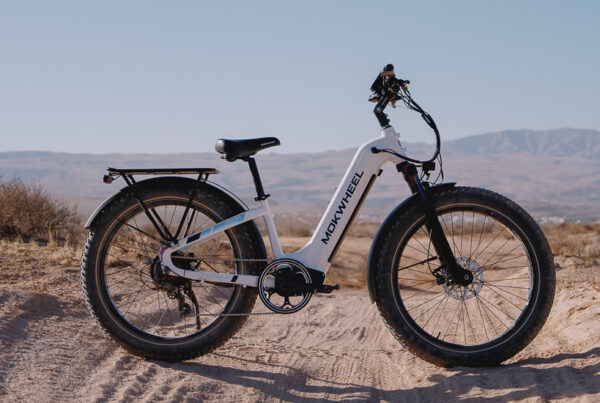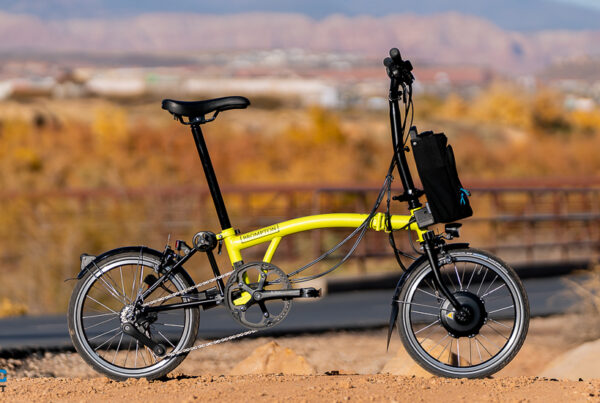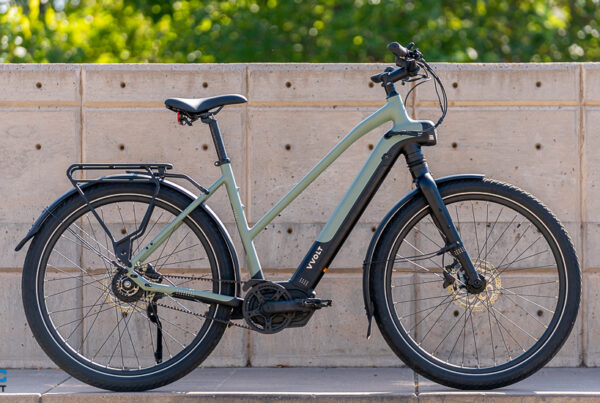Some links may be affiliate links. We may get paid if you buy something or take an action after clicking one of these.

The world economy is in upheaval right now, with supply chain difficulties seemingly everywhere, the e-bike industry being no exception (although there are plenty of new e-bikes announced in spite of that). Add on to this profound worries about a changing climate and the seeming reliance of governments around the world on electric cars to solve the problem (despite warnings from some that they are only a small part of the solution) and it seems some formidable challenges lie ahead in the 2020s and beyond.
But e-bikes can surely help everyone chart a path through the turmoil. Despite the 2022 rise in e-bike prices covered in this week’s news, they are still cheaper to run than any car and better for you and the environment than many alternative ways of getting about. Whether it be straitened economic times or a climate crisis it’s clear e-bikes are a significant part of the solution. And if the ‘reshoring’ of the US e-bike industry came to pass, as we also discuss this week, it would be a further part of the solution.
In this week’s news::
- Rad Power Bikes announces RadRunner 2
- Ride1UP debuts Cafe Cruiser
- Electra’s new cruiser-style hub motor models
- Zoomo’s ‘Moped Level’ Performance E-bike
- Bronx e-bike revolution
- Rad Power announces 2022 price increases
- Could bike manufacture return to the US?
RAD POWER BIKES’ NEW RADRUNNER 2

One of the leading D2C e-bike brands, Rad Power Bikes, released the follow up to one of their most popular models, the RadRunner 2.
The RadRunner debuted in 2019 and quickly spurred interest in utility bikes. A little bit cargo bike, a little bit commuter bike, a little bit whatever else you want it to be, the RadRunner is one of the few options of e-bikes that almost anybody could find a use for.
The newest edition of the RadRunner has slightly altered geometry in the headtube for a more relaxed feel, thicker cushioning on the seat, and some new accessories that enhance the passenger options (should you opt for that).
The “under the hood” elements seem largely the same: single-speed drivetrain, tektro mechanical disc brakes, 750W motor and a 672Wh battery.
It’s notable that this version of the RadRunner starts at $1,499 which is an increase from the original RadRunner by a few hundred dollars, but we have more on that down below
EWC reviewed the RadRunner Plus model and found it to be a an overall good riding electric bike. We’ll have to see how the RadRunner 2 stacks up.
RIDE1UP’S NEW CAFE CRUISER
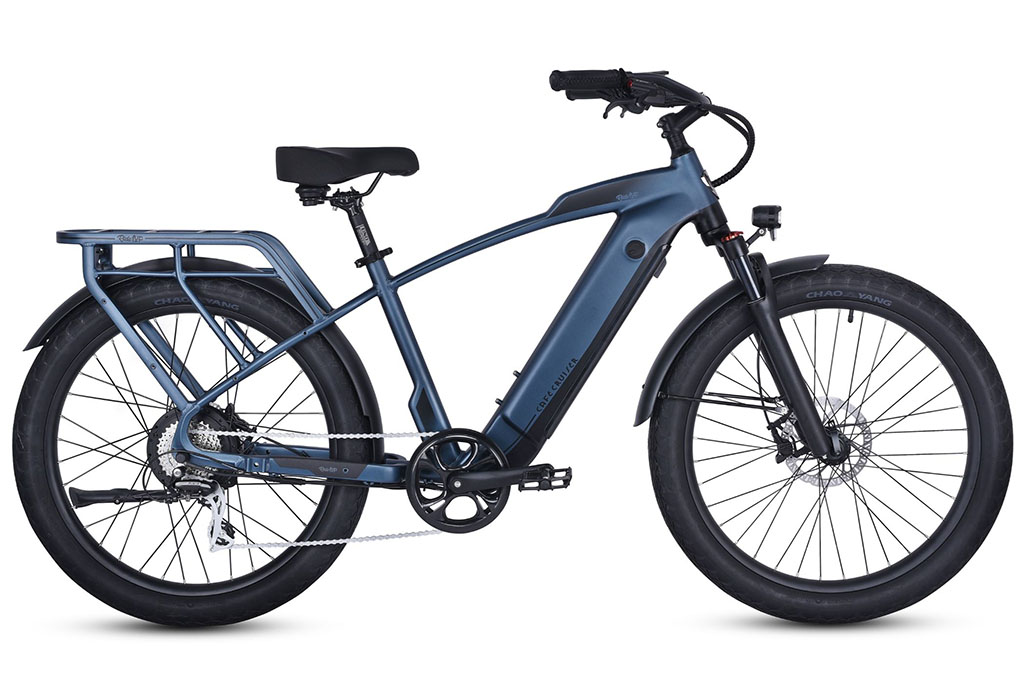
The Ride1UP e-bikes we’ve reviewed have proven to be affordable e-bikes where the quality typically exceeds the price.
Ride1UP is best known for commuter and city-styled e-bikes with nimble handling and speedy motors. They’ve dipped a toe in the cruiser styling of bikes with some fairly relaxed geometry and slightly swept-back handlebars, but they were by and large focusing on commuter aspects in most of their bikes.
Until now.
The new Cafe Cruiser represents a cannonball into some more typical cruiser features with the 40 degree handlebar sweep, 3” balloon tires, and an overall cruiser aesthetic that’s hard to miss.
It will also sport a 750W motor, 720 Wh battery, hydraulic disc brakes, and front fork with 80mm of travel.
Overall it’s impressively spec’d and seems like it’s giving you a lot of bag for your buck at $1,595. You can see the all the bike’s details at their website here.
NEW ELECTRA E-BIKES

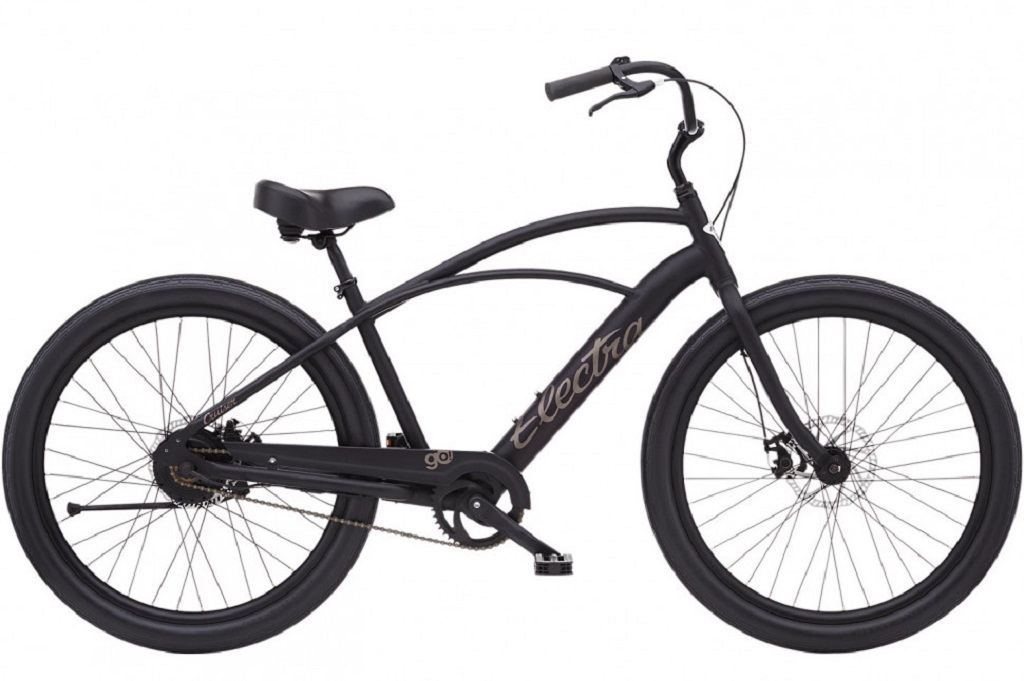
Cruiser Go!
Variants include Shibori Go! And Bali Go!, differentiated by their own distinctive paint jobs and the more understated Cruiser Go! but all are single speed models with distinctive cruiser style frames and balloon tires. Priced at $1549 – $1799 / £1600-£1750
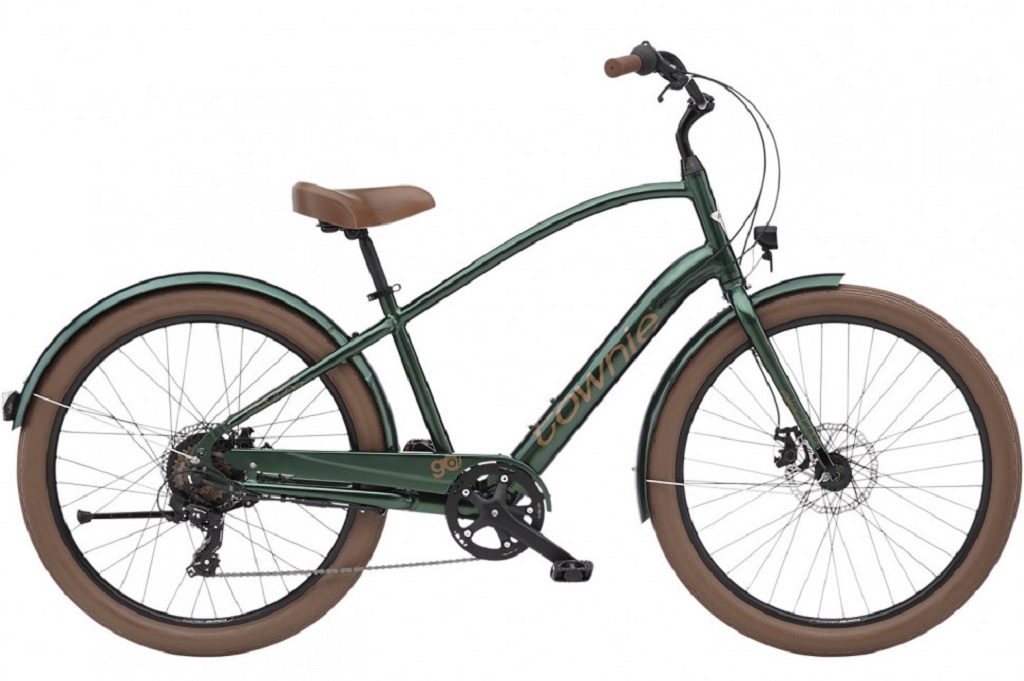
The Townie Go! 7D uses 7-speed Shimano gears and mechanical disc brakes and retails at $1750 whilst the UK version comes fully equipped as the EQ version for £1750
ZOOMO’S WANTS TO MAKE PETROL MOPEDS OBSOLETE WITH THEIR NEW E-BIKE
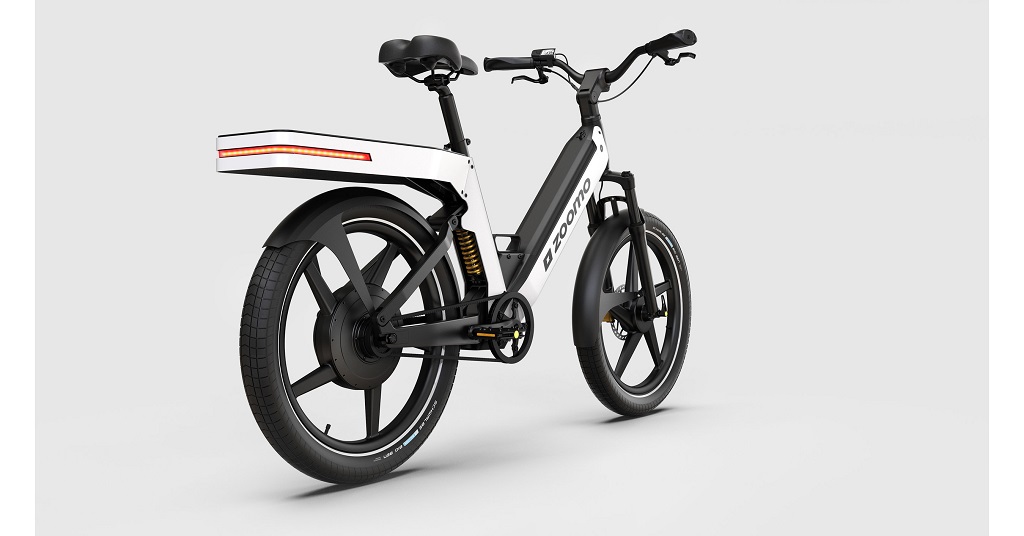
Zoomo specialise in providing e-bikes on short term ‘subscription’ contracts to gig economy workers such as food delivery riders. Up until now they have produced a range of solidly built and largely own-brand e-bikes for use in cities around the world where they have ‘shopfront’ premises and a team of mechanics who help to keep the bikes on the road as part of the maintenance plan.
But they clearly plan to move the world of food delivery on, both in terms of speed and the carrying capacity of the bikes they offer, as we can see from their recent announcement of the forthcoming Zoomo One, described in this Driven article as ‘its highest performance utility e-bike yet…..designed to supplant petrol mopeds for last-mile delivery.’
But as the same article points out, the Zoomo One ‘boasts an assisted top speed of 45km/h (28mph) and 60-kilograms of carrying capacity’ and therein lies what they call ‘the catch’. In many countries a 28mph machine is not on the same footing as an e-bike as there may be more costs in terms of insurance etc and the machines may well not be allowed on some or all bike paths, rather limiting their appeal to potential customers.
Still, on paper it looks an impressive machine, with integrated LED lighting, turn-signal indicating and a brake-lever activated rear light. There’s also a huge 1kWh swappable battery and even ‘advanced Internet of Things (IoT) and security features that provide valuable data aimed at helping to simplify delivery fleet management.’
The Zoomo One will go on sale in the United States, United Kingdom, and Europe with an RRP of $US4,000 / £3000 plus taxes in 2022, with additional options for software, servicing, and financing.
THE BRONX’S E-BIKE ‘REVOLUTION

Meanwhile, in The Bronx, New York, E-bike companies are teaming up with local non-profits to provide discounts to frontline workers and Zoomo are one of those involved along with the likes of Rad Power, Van Moof and Ride Panda – as reported by The Verge.
The New York scheme is part of The Equitable Commute Project and state funds are part of the financial help that means grants of up to 50% are available to the likes of local drivers, janitors, landscapers and home health aides.
There are similar schemes around the US in cities like Portland, Denver, and Buffalo who are launching pilot projects that explore ways to subsidize e-bike purchases for low-income families or collect enough bikes together to launch mini-shared micromobility services.
RAD POWER 2022 PRICE INCREASES

Elektrek reports that the one of the largest e-bike companies in the the US – if not the largest – ‘has just sent an email out to its customers and followers announcing that prices will increase across its line of electric bicycles starting at the end of this year.’ Rad Power haven’t said yet by how much.
The article also speculates that other US e-bike companies will follow suit and it also ponders what’s behind the increases, given that you might expect prices to stay steady or even fall in the wake of Rad Power garnering US$300 million of investment capital in 2021.
It hints that continuing ‘supply chain difficulties’ (i.e. a shortage of parts) are some of the explanation.
However supply chain difficulties themselves have more profound causes and this Guardian article gives a plausible explanation of the wider forces at play in the world economy at the minute. A particular quote from one economic expert stands out, regarding government responses to Covid in many countries around the world; ‘“Consumers are crazy to buy things because the world is awash with dollars from government stimulus, higher savings and pent-up demand. PlayStations, laptops, phones, gym equipment – you name it people are trying to buy it” – everything from empty shelves to labour shortages to high energy prices it seems can, at least in part, be attributed to this huge outpouring of money from government coffers.
COULD THE US ‘RESHORE’ ITS BIKE AND E-BIKE MANUFACTURING INDUSTRY?
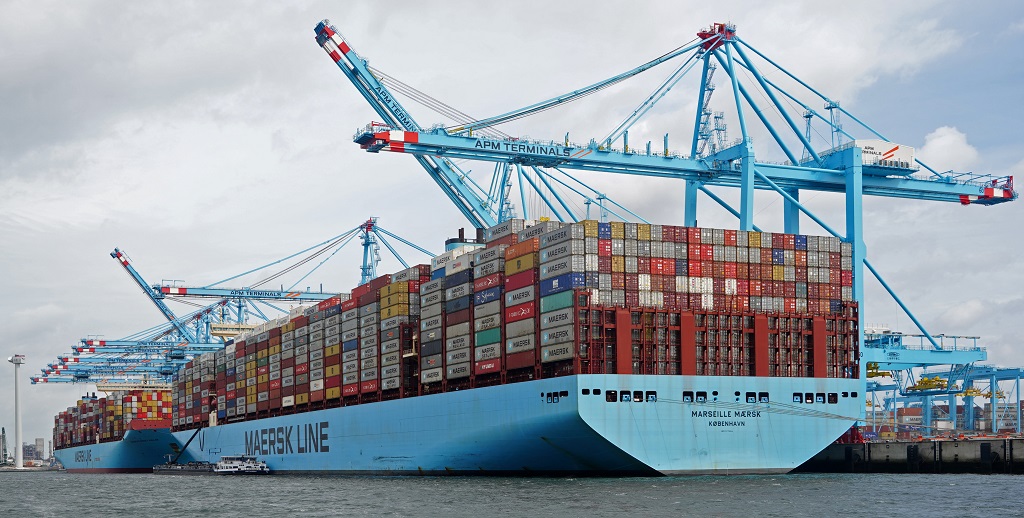
This fascinating article in Industry Week looks at the practicality and benefits of the US reshoring – i.e. bringing back to the US – bike and e-bike manufacture.
It points out ‘The European Union provides a template for such an effort. Beginning in 1993, the EU took aggressive action to block subsidized Chinese imports through stiff anti-dumping duties. In the early 2000s, EU countries began providing support for local manufacturers to invest in bicycle manufacturing. As a result, the EU today produces about 50% of the bikes—and 85% of the e-bikes—purchased in Europe. Portugal in particular has emerged as a major bicycle manufacturing hub—and now produces five times as many bikes as the U.S.’
The article is based on a new report by the Coalition for a Prosperous America (CPA) which posits that this rebuilding would start with bike assembly but would eventually include the manufacturing of bike frames, gears, brakes and other components. ‘The federal government would need to support this reshoring. But the costs—at under $1 billion of tax credits and SBA loan guarantees—would be minimal’ says the article.
Implementing a full bike reshoring plan could lead to roughly 25% of those bikes being assembled domestically within five years. CPA’s report estimates that this could create roughly 10,000 new, good-paying manufacturing jobs in the U.S.
Related
Reader Interactions
![]()
Source link






